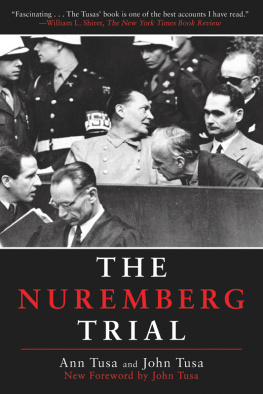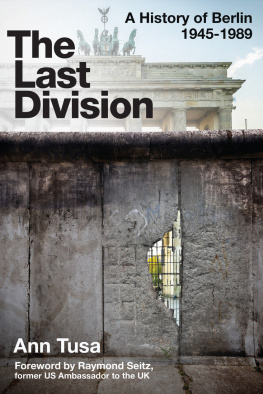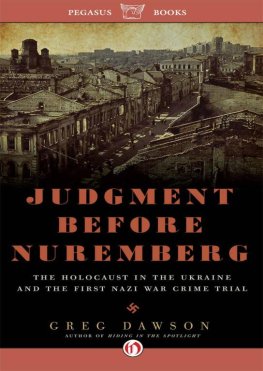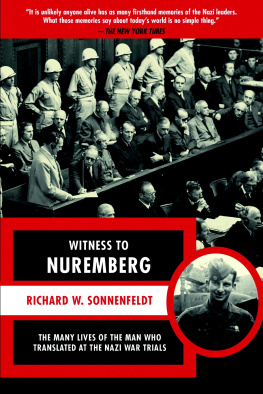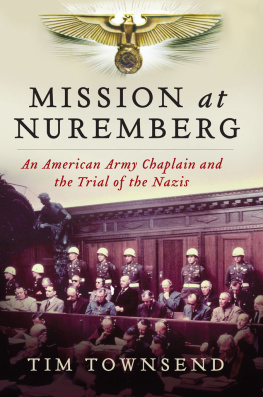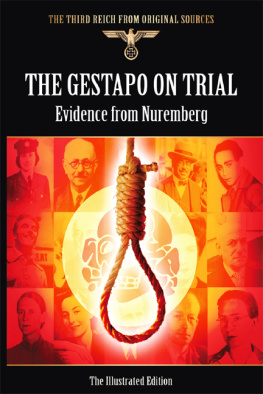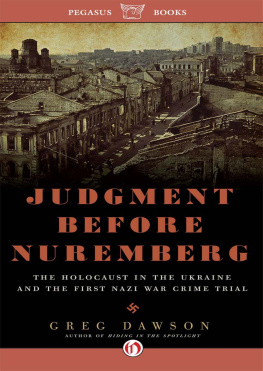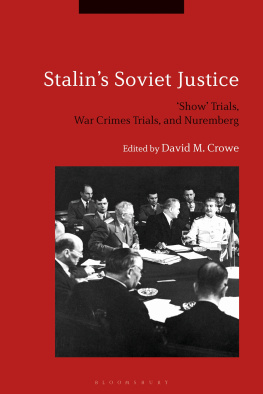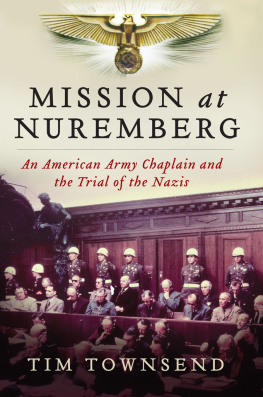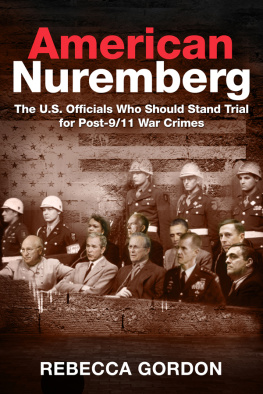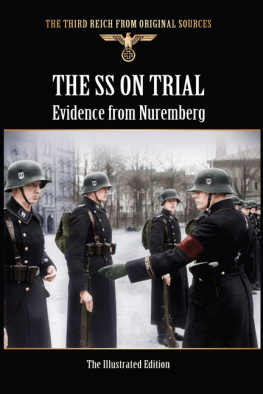Ann Tusa - The Nuremberg Trial
Here you can read online Ann Tusa - The Nuremberg Trial full text of the book (entire story) in english for free. Download pdf and epub, get meaning, cover and reviews about this ebook. year: 2010, publisher: Skyhorse Publishing, genre: Politics. Description of the work, (preface) as well as reviews are available. Best literature library LitArk.com created for fans of good reading and offers a wide selection of genres:
Romance novel
Science fiction
Adventure
Detective
Science
History
Home and family
Prose
Art
Politics
Computer
Non-fiction
Religion
Business
Children
Humor
Choose a favorite category and find really read worthwhile books. Enjoy immersion in the world of imagination, feel the emotions of the characters or learn something new for yourself, make an fascinating discovery.
The Nuremberg Trial: summary, description and annotation
We offer to read an annotation, description, summary or preface (depends on what the author of the book "The Nuremberg Trial" wrote himself). If you haven't found the necessary information about the book — write in the comments, we will try to find it.
The Nuremberg Trial — read online for free the complete book (whole text) full work
Below is the text of the book, divided by pages. System saving the place of the last page read, allows you to conveniently read the book "The Nuremberg Trial" online for free, without having to search again every time where you left off. Put a bookmark, and you can go to the page where you finished reading at any time.
Font size:
Interval:
Bookmark:
NUREMBURG
TRIAL
Ann Tusa and John Tusa
New Foreword by Ann Tusa and John Tusa

Copyright 2010 by Skyhorse Publishing, Inc.
All Rights Reserved. No part of this book may be reproduced in any manner without the express written consent of the publisher, except in the case of brief excerpts in critical reviews or articles. All inquiries should be addressed to Skyhorse Publishing, 555 Eighth Avenue, Suite 903, New York, NY 10018.
Skyhorse Publishing books may be purchased in bulk at special discounts for sales promotion, corporate gifts, fund-raising, or educational purposes. Special editions can also be created to specifications. For details, contact the Special Sales Department, Skyhorse Publishing, 555 Eighth Avenue, Suite 903, New York, NY 10018 or info@skyhorsepublishing.com.
www.skyhorsepublishing.com
10 9 8 7 6 5 4 3 2 1
Library of Congress Cataloging-in-Publication Data
Tusa, Ann.
The Nuremburg Trial/Ann Tusa and John Tusa ; new foreword by Ann Tusa and John Tusa.
p. cm.
Includes bibliographical references and index.
ISBN 978-1-61608-021-1 (history)
1. Nuremberg Trial of Major German War Criminals, Nuremberg, Germany, 1945-1946. I. Tusa, John. II. Title.
KZ1176.5.T87 2010
341.690268--dc22
2010010524
Printed in Canada
It was John Eidinow who first drew our attention to the Nuremberg Tribunal and suggested that it would repay scrutiny. At his suggestion we all wrote a series of radio programmes about Nuremberg which were transmitted in 1975. These confirmed his opinion that the subject was fascinating and showed us areas and questions which published sources did not cover. In a review of the programmes in The Listener Derek Parker considered that a history of the Tribunal would be of interest to the general reader. We are grateful to both of them for setting us on the road and to John for the interviews he then conducted for us with many of those who had been at Nuremberg.
Macmillans have given us valued support. Caroline Hobhouse took the risk of commissioning the book from untried authors hers was a much appreciated act of trust. Alan Samson first allowed us a long leash then, at the right moment, tugged it to discipline our gambolling in research and guide us to complete a manuscript. His patience and encouragement have soothed, reassured and cheered us. So too have Deborah Rogers wisdom and calm. We are glad to acknowledge our debt of gratitude to them.
We have a further great debt to all those who have been so generous with their time and observations and who allowed us to pick their brains and memories. We record their names in our list of interviews. All spoke with the priceless gift of having been present at an occasion we were struggling to reconstruct; they gave us insights and understanding, the whiff of reality, and an injection of their continued concern for the Tribunal. We thank them all. Some were especially generous. Above all we owe a lot to Kenneth Duke. He not only entrusted to us many papers made available for an earlier and aborted projected history by Sir John Wheeler-Bennett, but he also provided much valuable information about the collection of documents before the trial and the workings of the British prosecution team. Anthony Marreco has regularly broadened the perspectives with which we approached the subject and gently nudged us along fruitful lines. Thilo Bode has given us painstaking and expert help over the naval case. Where we have ignored their advice we acted from stubbornness not lack of appreciation; where we took it, we gained.
Finally we would like to thank our sons, Alexander and Francis, who cheerfully endured for so long lack of the attention which was their due and who never showed boredom when the subject of Nuremberg was raised yet again. In this, as so often, they have shown a tolerance which parents are fortunate to receive but have no right to expect. We hope the book will interest them in what was done in the past and provoke them to consider what should happen in the future.
The trial of the 22 major Nazi war criminals at Nuremberg lasted for ten months from November 1945 to September 1946. The Nuremberg Trial was first published in 1983. Since then, no new evidence has emerged to cast serious doubt on the verdicts of the judges or to change the views of the authors.
Our opinions and those of the judges were based on documents. The book relies heavily on the 22 published volumes of the transcript of the proceedings, the verbatim record of everything said and read out at the trial. The court hearings and final judgement were mainly based on Nazi records; those read in evidence and another published twenty or so volumes of documents submitted for further consideration. Virtually all of these documents were written or at least signed by the defendants themselves. They remain incontrovertible proof of crime. Any new evidence which has been produced since 1946 (such as the Wannsee Protocol, setting out the decision to exterminate the Jews) has only hardened the caseif it was neededagainst the Nazi regime.
From the day the intention of setting up a tribunal at Nuremberg was announced, some have carped at the justice of holding proceedings at all. People still sneer victors justicewithout knowingor caringthat they are quoting the view of the chief defendant, Hermann Goering. The judges were, indeed, appointed by the four major powers who had defeated Nazi Germany in the Second World War. But this was no show trial: nine months of evidence was heard in court; much more time was given to the defence case than to that of the prosecutors; three of the 22 accused were acquitted, only twelve were hanged.
Other questions were raised about whether the right men were in the dock, whether other egregious criminals should have been there side by side. Well, better known Nazis such as Adolf Hitler and Heinrich Himmler had already taken their own lives, or had taken the boat to South America. No one can plausibly argue that no alleged murderer should be tried unless or until all likely murderers have been arrested. There were complaints, too, that high Nazi leaders sat in the dock with comparatively lowly placemen or mere regime dogsbodies. Yet the verdicts showed that the judges were well aware of the ranges of guilt facing them rather, it could have been claimed that the lesser defendants received lighter sentences than they deserved because their crimes were so completely overshadowed by those of their superiors sitting by their sides.
There are other more serious matters to debate. Did an international court have the right to examine a states treatment of its own citizens, however vile? The judges dodged a decision and instead rested their verdicts on crimes committed by Nazi forces in occupied territories. Was the charge of aggressive war based on retrospective law, even newly-minted for the occasion? Was the charge of conspiracy acceptable in international law or was it an American import and convenient catch-all? The members of the Tribunal were aware of these pitfalls and were duly nervous of acting without precedent. They stated that aggressive war had been long outlawed by international treaty; they listened carefully to the prosecution case on conspiracy by the Nazi regime. But their sentences were based on the age-old crime of murder; their verdicts were based on what one prosecution counsel called the defendants nearness to the corpses.
Whatever the legal arguments, many of the Tribunals decisions on the law were adopted by the United Nations and absorbed into international criminal law. But has the Tribunals impact been as great as was hoped? Aggressive war was denounced yet it continues; genocide seems endemic; kidnapping was condemnedbut has been re-named extraordinary rendition; torture has re-emerged as enhanced interrogation; civilians continue to be the victims of battle but are explained away as collateral damage. The demands for justice, punishment, collective judicial action and legal restraints remain powerful but often go unheard.
Font size:
Interval:
Bookmark:
Similar books «The Nuremberg Trial»
Look at similar books to The Nuremberg Trial. We have selected literature similar in name and meaning in the hope of providing readers with more options to find new, interesting, not yet read works.
Discussion, reviews of the book The Nuremberg Trial and just readers' own opinions. Leave your comments, write what you think about the work, its meaning or the main characters. Specify what exactly you liked and what you didn't like, and why you think so.

